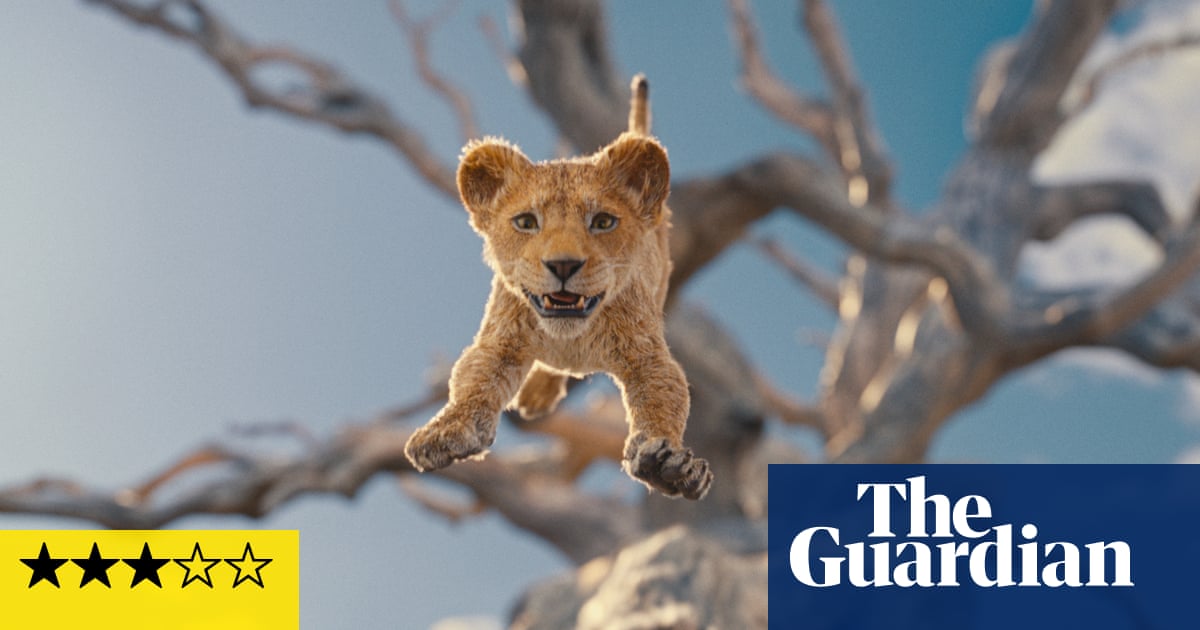
How did Scar, the wicked uncle from The Lion King voiced by Jeremy Irons, get to be so … well … wicked? How is it that he was only ever known by that cruel and callous nickname, while everyone else got noble-sounding multisyllabic names ending in vowels? Was he once nice, even misunderstood? And, in providing the answers, will the prequel give a clear rebuke to the now rather discredited facial-scarring-equals-evil equation? Well, the answers will show that this movie musical, like the original, is still a rather old-fashioned Kiplingesque creation at heart.
It is certainly Scar who has the important character arc and narrative journey here, so it should perhaps be his name in the title. Mufasa, originally voiced by the legendary James Earl Jones, here turns out to be a thoroughly and unsurprisingly decent character from the outset. This movie, a backstory-followup to the 1994 classic in the same photorealistic animated style as the 2019 reboot, is in fact a punchy, heartfelt and rather ingenious drama, with a fair bit of storytelling energy from screenwriter Jeff Nathanson and director Barry Jenkins.
It gives us an origin myth for Mufasa, Scar, Sarabi, Rafiki, even the geological form of Pride Rock itself. Its musical score, however, is forgettable, nowhere near the class of Elton John and Tim Rice’s songs from 1994 and the lyrics don’t have Rice’s inspired wit, like Scar’s devilish promise of inducements in return for following him over to the dark side: “… I know it sounds sordid/But you’ll be rewarded …” The pompous servant bird Zazu (originally played by Rowan Atkinson and then John Oliver) now returns, voiced by Preston Nyman, but is now pretty much a joke-free zone.
The story of King Mufasa’s dramatic cubhood is an orphan/quest narrative recounted in flashback by the aged, wise mandrill Rafiki, voiced by John Kani, to the late Mufasa’s saucer-eyed granddaughter Kiara – that is, Simba and Nala’s daughter – voiced by Blue Ivy Carter. (Let’s hope Kiara absorbs the lesson of Scar, incidentally, and is not nursing any assumptions of future monarchical power which might be derailed by the arrival of a brother.) Also listening to the story are those naughty scamps Pumbaa (Seth Rogen) and Timon (Billy Eichner) which is a neat way of keeping these popular comic turns in the action.
Young Mufasa (voiced by Braelyn Rankins as a cub and Aaron Pierre as a lion), is a brave, good-natured but lowborn figure; his parents are swept away in a flood and, while desperately fending for himself, Mufasa has his life saved by a princeling lion called Taka (voiced with a giveaway Brit accent by Theo Somolu as a cub and later in similarly limey tones by Kelvin Harrison Jr). Taka becomes Mufasa’s best pal and stepbrother in all but name; he welcomes this foundling into his royal family, though increasingly nettled at the way Mufasa appears better than him in manly, or rather lionly, physical pursuits. When the royal family is attacked by a predatory pride of “white lions” it is outsider Mufasa who saves them while Taka cringes back.
It is when Taka’s father sends him away on a trek to a far-off rumoured land of safety and orders Mufasa to accompany him that Taka’s resentment escalates into full-blown beta-male envious mediocrity. Taka falls in love with Sarabi (Tiffany Boone) the courageous lioness who has befriended the two on the road, and Taka is eaten up inside on seeing how Sarabi is enamoured of Mufasa’s effortless nobility, sensitivity and courage. And all the time these evil “white lions” with their slashing claws are closing in on them.
In turning the circle of life anti-clockwise to tell us this tale from the past, Mufasa: The Lion King duplicates ideas and personae from the earlier films – perhaps inevitably, as part of its ethos is that all lions are existential restatements of their ancestors. (However, the horrible – and for some, problematic – hyenas of the first film have vanished.) Mufasa gives no hint of the famous “great chain of being” speech that he gives to young Simba in the original film, in which he claims that eating antelopes is OK, because when lions die they become grass which is eaten by antelopes – notoriously passing over the fact that this grass will not feel fear and pain in the same way. But all the lesser animals will of course end up bowing, herbivores and carnivores, prey and predator alike. All in all, this is not a bad tale from the Disneyfied continent of talking animals, but a minor cousin to the first film’s movie-royalty.
Source: theguardian.com

















